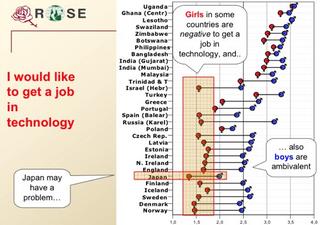A few postings ago I ranted about how what's considered "technology" varies between the developed and the developing world. Another observation about that:
Recently at Danfoss universe we had professor Neil Gershenfeld from MIT's Center for Bits and Atoms visit us and talk about his "fablab" concept.
His observation was that in developed countries, the fablabs would be used by people who created stuff they need: spare parts, some sort of sensor, a better machine for their work - practical things for daily survival.
At the fablab in Boston and at his classes at MIT, the lab would be used for self expression; art projects, weird non-rational ideas.
To me, the important part is that it's all very creative and no matter if you are creating to survive or creating to fight boredom, you need to get some basic understanding of the tools and the principles of constructing things in order to make an idea physical.
But it underlines the differences in how we approach technology in different parts of the world.
Tuesday, September 20, 2005
Big green
So GE is going green - or, at least they're making a big splash with their new Ecomagination theme..
In a way I would love to think that they are serious about their commitment, I really hope that they have realized that they can play a decisive role in changing the course away from destruction. But then again, it's hard not to be a bit cynical about corporate greeenwash.
There are some weird, but no doubt carefully calculated, touches to their website. It shows CEO Immelt and others talking to us, set in an abstract landscape held in earthly green and brown colors. There are trees, birds, water - and then an airplane crosses the sky in the background. I guess it's meant to show that planes are as natural as birds.
Another part of the flash animation shows a big cruise ship making it's way in the background. GE assures us: planes and cruise ships will not go away, even if we try to save the planet.
GE presents some amazing statistics and predictions, quoting the UN:
Registered autos in 1990: 560 mio.
- in 2010: 940 mio.
Oil consumption in 1990: 24 bio. barrels
- in 2010: 38 bio. barrels
Soft drink consumption in 1990: 364 mio. barrels
- in 2010: 765 mio. barrels
Municipal waste in 1990: 420 mio. tons
- in 2010: 860 mio. tons
In a way I would love to think that they are serious about their commitment, I really hope that they have realized that they can play a decisive role in changing the course away from destruction. But then again, it's hard not to be a bit cynical about corporate greeenwash.
There are some weird, but no doubt carefully calculated, touches to their website. It shows CEO Immelt and others talking to us, set in an abstract landscape held in earthly green and brown colors. There are trees, birds, water - and then an airplane crosses the sky in the background. I guess it's meant to show that planes are as natural as birds.
Another part of the flash animation shows a big cruise ship making it's way in the background. GE assures us: planes and cruise ships will not go away, even if we try to save the planet.
GE presents some amazing statistics and predictions, quoting the UN:
Registered autos in 1990: 560 mio.
- in 2010: 940 mio.
Oil consumption in 1990: 24 bio. barrels
- in 2010: 38 bio. barrels
Soft drink consumption in 1990: 364 mio. barrels
- in 2010: 765 mio. barrels
Municipal waste in 1990: 420 mio. tons
- in 2010: 860 mio. tons
Monday, September 19, 2005
So you think you can tell
 An amazing quote from Shell's scenario planning division in their 2001 scenarios "energy need, choices and possibilites 2050":
An amazing quote from Shell's scenario planning division in their 2001 scenarios "energy need, choices and possibilites 2050":”Technology improvements are likely to outpace rising depletion costs for at least the next decade, keeping new supplies below $20 per barrel.
The costs of biofuels and gas to liquids should both fall well below $20 per barrel of oil equivalent over the next two decades, constraining oil prices”.
...This is the worlds' largest oil company and its very well qualified scenario division speaking.
Wednesday, September 14, 2005
Wrecking the world for trinkets

There’s a certain genre of products that I vigorously hate. The stuff you buy in gift shops, or in the kind of surplus stores where every item in the store costs a euro or two. Cheap toys, cheap tools, decorations, colorful blinking gadgets.
At every birthday you end up with a heap of these items. Trinkets, little curiosities, jokes. A pen radio, a weird looking plastic sculpture, a set of screw drivers...
My problem with it is that in one sense these things are not cheap at all. There’s a price. You get a clear sense that behind each of them, there’s some horror story of dreadful working conditions, toxic materials, and poor people slaving at miserable salaries.
How else can you make money on transporting an item all the way here – where somebody still is able to make money on it, though it only costs a couple of euros.
Another reason I get upset is this whole idea of producing stuff so cheaply that it doesn’t really ever work. Tools that are so imprecise and cast from soft iron so soft you can’t do anything with them. Toys that only work for a few minutes, ”funny” figures of plastic that are fun for a moment – and then gather dust. What are we teaching our kids by giving them this crap?
Items made of finite or toxic materials, wrapped in even more materials, shipped across the globe, giftwrapped – all this, just to proceed straight to the junkheap.
I get the feeling that we are wrecking the world for trinkets.
Outlook - the game

On several occasions lately, I’ve been trying to explain why MMOGs (yes, Massively Multiplayer Online Games) are interesting to study as an indicator of how we will cooperate, socialize, trade, create and seek information in the years ahead.
The hard part part is the ”game” word. Games, and computer games in particular, carry a lot of stigma. Many see it as exactly the opposite of the kind of interaction and participation they would like to see.
It seems to help if you describe the ubiquitous Microsoft Outlook as an MMOG. We don’t think of it as playing a game, but we do spend hours in that environment, dealing with lots of players, some of whom we build up quite close relationships to online. Like an MMOG, Outlook is something you build up, it’s persistent and dynamic, even if you’re not yourself online. There’s considerable creative possibilities, you can trade, exchange information or products, you can co-create, you can have pranks and challenges.
But of course, there’s not much in terms of graphics, no avatars, no soundtrack – yet...
Saturday, September 10, 2005
Jetplanes and guilt
No doubt that airplanes consume lots of fossil fuel and generally mess up the atmosphere in a major way. Nevertheless, travelling is hard to avoid if you wanna get anywhere.
My good friend Adam has heard my scruples about flying for years. He pointed me to this article from OnEarth Magazine which tells about a number of organisations that will plant trees for you to offset the effects of your flying.
For instance, a round trip from San Francisco to Shanghai will produce 2.2 tons of carbondioxid emissions. This can (in some more or less abstract sense) be offset by planting three trees or changing three ordinary light bulbs to energy saving ones. Depending on what organisation you choose, for around $20-40 you can have them plant the trees or install lightbulbs.
Among the organisations are American Forests, which have an online Climate calculator that will give you a sobering view at the side effects of transportation.
My good friend Adam has heard my scruples about flying for years. He pointed me to this article from OnEarth Magazine which tells about a number of organisations that will plant trees for you to offset the effects of your flying.
For instance, a round trip from San Francisco to Shanghai will produce 2.2 tons of carbondioxid emissions. This can (in some more or less abstract sense) be offset by planting three trees or changing three ordinary light bulbs to energy saving ones. Depending on what organisation you choose, for around $20-40 you can have them plant the trees or install lightbulbs.
Among the organisations are American Forests, which have an online Climate calculator that will give you a sobering view at the side effects of transportation.
Tuesday, September 06, 2005
What's the right question?

There’s plenty of concern about the lack of interest and knowledge about technology and natural science among children and students. However, it’s a little hard for me to see exactly where the problem lies. For instance, The ROSE study, which has asked a huge number of children all over the world about their interests in science, clearly shows that children in the richest countries have the least interest and respect for science.
A particularly telling statistic is this figure, which I have taken from a presentation by Norwegian professor Svein Sjöberg who leads the Rose study.
Kids were asked if they would like to get a job in technology. This is very appealing to kids in countries like Lesotho, Uganda or Zimbabwe, whereas kids are increasingly negative the richer the country the come from is. The least interested in a technology job are Japanese boys.
Other questions in the study show pretty much the same attitude to science and technology.
Now, does this mean that Japanese boys don’t care about technology? I doubt it. It’s hard to think of anyone who are more inundated by technology than japanese boys. They live in a world that is nothing but technology, and mastering technology determines how well they can participate socially in society.
Technology in Osaka is not the same as in Kampala. The japanese boy may not be interested in basic technology, because it is not relevant and immediately necessary for him to know about it in the same way that it is for someone in Uganda.
You miss something very important if you don’t realize that the japanese boy is very likely to have an expert knowledge in technologies like sharing files, surfing and downloading, choosing the right shoe for athletics or the set of headphones with just the right sound. But it could very well be that this is not ”technology” to him – it’s just the way the world works.
Maybe we need to ask the question in a different way in order to understand what relation students have to science. I bet it would turn out to be a lot more sophisticated than current studies show.
Subscribe to:
Comments (Atom)
